The Dream of Perpetual Motion by Dexter Palmer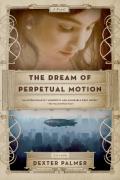
As I
mentioned before, I picked up
The Dream of Perpetual Motion at
the Strand (for some reason this bookstore requires the definite article). I was intrigued by the novel's title and cover design (art and text).
I can't say that I enjoyed reading
The Dream of Perpetual Motion, but I did find it strangely compelling.
1 I think I may have enjoyed it more if I had a better grasp on
The Tempest (I've never read this play - horror of horrors!), which is heavily referenced in the novel.
The Dream of Perpetual Motion is around the turn of the (20th) century in a city called Xeroville. The "age of miracles" is gone, but only just.
2 It is now the age of technology, of mechanization, of The Future. No one has done more to usher in this machine age than Prospero Taligent, inventor, entrepreneur, originator of mechanical men, and adoptive father of Miranda.
The novel's protagonist and narrator is one Harold Winslow (read: Ferdinand), a greeting-card writer, who has been imprisoned on a zeppelin powered by perpetual motion technology. Harold is alone, but for the cryogenically frozen body of his jailer (Prospero), the disembodied voice of his only love (Miranda), and the automata maintaining the zeppelin. The text of
The Dream of Perpetual Motion is that of the journal in which Harold explains how exactly he came to be in his current predicament, interjecting his narrative with brief updates on his present circumstances.
I found
The Dream of Perpetual Motion profoundly disorienting. The novel's prose is evocative and often dreamlike. It is for the most part very slow-paced and the emphasis on language (rather than plot) tends to slow it down even more.
I've been thinking that I didn't like
The Dream of Perpetual Motion, but that can't possibly be true, not when I look at the evidence. I've
already confessed on this blog to dog-earring my own books so I can freely admit that I did so to my copy of
The Dream of Perpetual Motion. Not to keep my place, but to mark pages to which I wanted to return. Ten of them. Ten really is quite a lot for me, a book of this size would usually only yield 1-3. Here are a couple of passages that I wanted to revisit:
"Write down what you think happened, or what you believe happened, of something like what might have happened. All these things are better in the end than writing down nothing at all; all are true in their own way" (113).
"an imperfect grace is never what we seek when we fantasize about our futures, when we dream of a long life with someone we claim to love or we build machines that we read about in science fiction. We want all possible things made actual, the perpetual possibility of perfection, the best of all futures all at once. But whatever we accomplish in the end never measures up. We always fail. We always fall short. Because when we see the perfect thing before us we fell we have to touch it. And then it vanishes or bruises or turns to show its hidden flaws or turns to dust" (340-341).
That being said, the bits of the novel that I found really and truly interesting were few and far between. Thinking back, I keep remembering little bits and wishing that they could have been expanded on.
If I haven't made it clear already,
The Dream of Perpetual Motion is no steampunk adventure novel. Yes, I think we can safely consider it steampunk, but
The Dream of Perpetual Motion is literary to a fault. Palmer has created an interesting world, but its obscured rather than illuminated by his prose.
I'm going to leave
The Dream of Perpetual Motion among my other books for now. I feel like I should reread it after reading
The Tempest, but I'm not altogether sure that I want to.
- I'll admit that I've been procrastinating. I haven't wanted to post about the novel because I really have no idea what to write. The draft of this post has been stalled for ages, but I'm making myself push through today whether I like it or not.
- I was so intrigued by the references to this earlier time period. Here's one: "By the time the touring Exposition of the Future came to our town, all the signs were in the air that the age of miracles was almost at its end. It wasn't uncommon to see sights like an angle staggering down the middle of a street in broad daylight, weaving like a drunkard, clutching its hand to its stomach and vomiting up blood. My father was a metalsmith, and more than half his income in those last days came from demons, who'd come to the back door of his establishment under cover of night, sacks of silver clutched in their clawed hands, begging him to use his tools to file off their magnificent curling horns" (190-191).
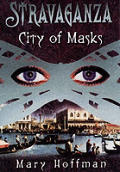 As I mentioned in this post, I've been a bit overwhelmed lately. When I'm stressed I'm fond of pulling out old standbys. My current choice for comfort reading is Mary Hoffman's Stravaganza series, which I first posted about in 2008 (post).
As I mentioned in this post, I've been a bit overwhelmed lately. When I'm stressed I'm fond of pulling out old standbys. My current choice for comfort reading is Mary Hoffman's Stravaganza series, which I first posted about in 2008 (post). 
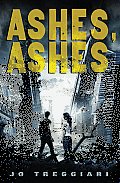 Epidemics, floods, droughts--for sixteen-year-old Lucy, the end of the world came and went, taking 99% of the population with it. As the weather continues to rage out of control, and Sweepers clean the streets of plague victims, Lucy survives alone in the wilds of Central Park. But when she's rescued from a pack of hunting dogs by a mysterious boy named Aidan, she reluctantly realizes she can't continue on her own. She joins his band of survivors, yet, a new danger awaits her: the Sweepers are looking for her. There's something special about Lucy, and they will stop at nothing to have her.
Epidemics, floods, droughts--for sixteen-year-old Lucy, the end of the world came and went, taking 99% of the population with it. As the weather continues to rage out of control, and Sweepers clean the streets of plague victims, Lucy survives alone in the wilds of Central Park. But when she's rescued from a pack of hunting dogs by a mysterious boy named Aidan, she reluctantly realizes she can't continue on her own. She joins his band of survivors, yet, a new danger awaits her: the Sweepers are looking for her. There's something special about Lucy, and they will stop at nothing to have her.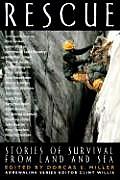 Following the successes of
Following the successes of 
 Last week a coworker and fellow Austen fan she made a reference to how Mr. Bennet handles Mary's performance at the ball (in
Last week a coworker and fellow Austen fan she made a reference to how Mr. Bennet handles Mary's performance at the ball (in 

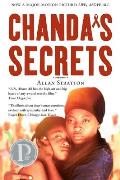 Sixteen-year-old Chanda Kabelo has secrets. Her mother is acting strangely, her little sister is out of control, and her best friend is in serious trouble. To make matters worse, people are dying around her. Everyone is afraid to say why, but Chanda knows: it’s because of AIDS.
Sixteen-year-old Chanda Kabelo has secrets. Her mother is acting strangely, her little sister is out of control, and her best friend is in serious trouble. To make matters worse, people are dying around her. Everyone is afraid to say why, but Chanda knows: it’s because of AIDS. 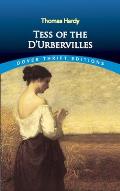 A ne'er-do-well exploits his gentle daughter's beauty for social advancement in this masterpiece of tragic fiction. Hardy's 1891 novel defied convention to focus on the rural lower class for a frank treatment of sexuality and religion. Then and now, his sympathetic portrait of a victim of Victorian hypocrisy offers compelling reading.
A ne'er-do-well exploits his gentle daughter's beauty for social advancement in this masterpiece of tragic fiction. Hardy's 1891 novel defied convention to focus on the rural lower class for a frank treatment of sexuality and religion. Then and now, his sympathetic portrait of a victim of Victorian hypocrisy offers compelling reading.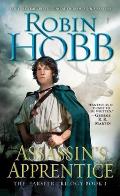 Fitz is the bastard son of the Six Duchies' king-in-waiting, Prince Chivalry, who abdicates the throne when he learns of Fitz's existence. Fitz is left in the care of Chivalry's gamekeeper until King Shrewd decides that Fitz must live in the keep and be trained. But Fitz is not given an education appropriate to a prince, he's apprenticed to Chade, King Shrewd's assassin. Fitz must put his talents, learned and innate, to use for the king because royal bastards are only kept alive as long as they are useful.
Fitz is the bastard son of the Six Duchies' king-in-waiting, Prince Chivalry, who abdicates the throne when he learns of Fitz's existence. Fitz is left in the care of Chivalry's gamekeeper until King Shrewd decides that Fitz must live in the keep and be trained. But Fitz is not given an education appropriate to a prince, he's apprenticed to Chade, King Shrewd's assassin. Fitz must put his talents, learned and innate, to use for the king because royal bastards are only kept alive as long as they are useful.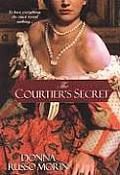 17-year-old Jeanne Du Bois was sent off to a convent seven years ago. When the sisters tire of her insolence, Jeanne is returned to court (Louis XIV's at Versailles). Stifled by the restrictions of life as a female courtier, Jeanne spends what free time she has eavesdropping on the palace's school room and sneaking off to fencing lessons with her uncle.
17-year-old Jeanne Du Bois was sent off to a convent seven years ago. When the sisters tire of her insolence, Jeanne is returned to court (Louis XIV's at Versailles). Stifled by the restrictions of life as a female courtier, Jeanne spends what free time she has eavesdropping on the palace's school room and sneaking off to fencing lessons with her uncle.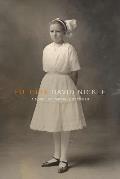 Subtitled "a novel of terrible optimism,"
Subtitled "a novel of terrible optimism," 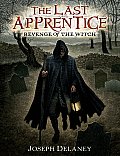
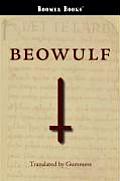 The first true masterpiece of English literature,
The first true masterpiece of English literature, 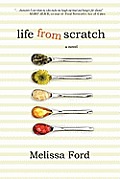 ETA (13 April 2012): A commenter on
ETA (13 April 2012): A commenter on 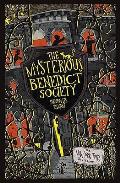 Four children with unusual talents are recruited for a top-secret mission. There is only one rule - there are no rules.
Four children with unusual talents are recruited for a top-secret mission. There is only one rule - there are no rules. 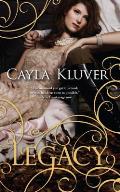 "I really have no choice," I said, confident he would acknowledge the difficulty of my circumstances.
"I really have no choice," I said, confident he would acknowledge the difficulty of my circumstances.
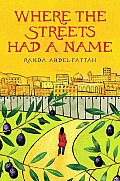 Thirteen year old Hayaat is on a mission. She believes a handful of soil from her grandmother's ancestral home in Jerusalem will save her beloved Sitti Zeynab's life. The only problem is that Hayaat and her family live behind the impenetrable wall that divides the West Bank, and they're on the wrong side of check points, curfews, and the travel permit system. Plus, Hayaat's best friend Samy always manages to attract trouble. But luck is on the pair's side as they undertake the journey to Jerusalem from the Palestinian Territories when Hayaat and Samy have a curfew-free day to travel.
Thirteen year old Hayaat is on a mission. She believes a handful of soil from her grandmother's ancestral home in Jerusalem will save her beloved Sitti Zeynab's life. The only problem is that Hayaat and her family live behind the impenetrable wall that divides the West Bank, and they're on the wrong side of check points, curfews, and the travel permit system. Plus, Hayaat's best friend Samy always manages to attract trouble. But luck is on the pair's side as they undertake the journey to Jerusalem from the Palestinian Territories when Hayaat and Samy have a curfew-free day to travel.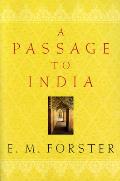 Among the greatest novels of the twentieth century,
Among the greatest novels of the twentieth century,  As I
As I 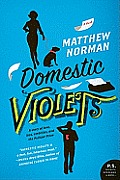

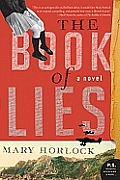 We talk about getting away and seeing the world, but we never do. We stay here making the same mistakes, over and over. (8)
We talk about getting away and seeing the world, but we never do. We stay here making the same mistakes, over and over. (8)